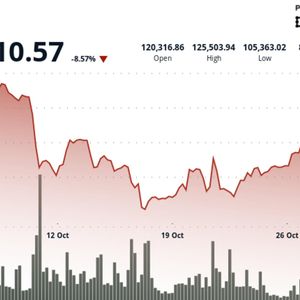BitcoinWorld Bitcoin Shortage: Michael Saylor’s Urgent Warning to Investors Michael Saylor, the prominent CEO of MicroStrategy, recently shared a chilling thought on X (formerly Twitter) that goes beyond spooky season ghosts: the real fear isn’t goblins, but a Bitcoin shortage . This bold statement underscores a critical discussion in the crypto world: the inherent scarcity of Bitcoin and its profound implications for investors. Saylor’s insight urges us to look beyond daily price fluctuations and consider the fundamental economics that could shape Bitcoin’s future. What Exactly Drives the Fear of a Bitcoin Shortage? The concept of a Bitcoin shortage might sound alarming, but it’s rooted in the cryptocurrency’s design. Unlike traditional currencies that can be printed infinitely, Bitcoin has a strictly limited supply. Only 21 million Bitcoins will ever exist, a cap programmed into its very protocol by its pseudonymous creator, Satoshi Nakamoto. Fixed Supply: The absolute limit of 21 million coins ensures that Bitcoin is a deflationary asset by design. This hard cap makes it fundamentally different from fiat currencies. Halving Events: Approximately every four years, the reward for mining new Bitcoin is cut in half. This process, known as the ‘halving,’ reduces the rate at which new Bitcoins enter circulation, further tightening supply. The most recent halving occurred in April 2024, significantly reducing new supply. Lost Coins: Millions of Bitcoins are permanently lost due to forgotten passwords, misplaced hardware wallets, or accidental transfers to unrecoverable addresses. These lost coins effectively reduce the circulating supply, making the available Bitcoin shortage even more pronounced. Essentially, these factors combine to create an environment where demand could eventually outstrip the available supply, leading to a genuine scarcity. How Does Bitcoin Scarcity Impact Your Investment Strategy? Understanding the potential for a Bitcoin shortage is crucial for any investor looking at the long game. Scarcity often drives value, and Bitcoin is no exception. As more individuals and institutions recognize Bitcoin’s role as a store of value and a hedge against inflation, demand naturally increases. Therefore, a limited supply combined with rising demand creates upward pressure on its price. Investors who hold Bitcoin for the long term, often referred to as ‘HODLers,’ are betting on this fundamental economic principle. Furthermore, the increasing institutional adoption of Bitcoin, seen through spot ETFs and corporate treasury allocations, adds another layer of demand, potentially accelerating the perceived Bitcoin shortage . Consider these points: Value Appreciation: Historically, periods following halving events have seen significant price increases due to reduced supply. Inflation Hedge: Many view Bitcoin as ‘digital gold,’ a safe haven asset that retains its value during economic uncertainty and inflation, further increasing its appeal. Long-Term Vision: For many, Bitcoin is not a short-term trade but a generational asset, making the idea of future scarcity a core part of their investment thesis. Navigating the Future: Opportunities Amidst a Potential Bitcoin Shortage While the idea of a Bitcoin shortage might evoke a sense of urgency, it also highlights significant opportunities for informed investors. Preparing for such a scenario involves strategic planning and a deep understanding of the market dynamics. It’s not about panic buying, but about making deliberate, well-researched decisions. Here are some actionable insights: Dollar-Cost Averaging (DCA): Instead of trying to time the market, consistently investing a fixed amount over time can mitigate volatility and build a position steadily. Self-Custody: Taking control of your private keys ensures you truly own your Bitcoin, protecting it from third-party risks. This becomes even more critical in a world of increasing scarcity. Education: Staying informed about Bitcoin’s technology, market trends, and macroeconomic factors is paramount. Knowledge empowers better decision-making. However, challenges also exist. The path to widespread adoption and price stability is not without its hurdles, including regulatory uncertainties and market volatility. Ultimately, the potential for a Bitcoin shortage reinforces its unique position in the global financial landscape, presenting both compelling benefits and areas for careful consideration. Conclusion: Embracing the Scarcity Mindset Michael Saylor’s warning about a Bitcoin shortage serves as a powerful reminder of Bitcoin’s foundational principles. Its finite supply, combined with ever-increasing demand, paints a clear picture of a digital asset designed for long-term value appreciation. While no one can predict the future with absolute certainty, understanding the economics of scarcity is vital for anyone participating in the cryptocurrency market. As Bitcoin continues to mature, its inherent scarcity will likely remain a dominant narrative, shaping its trajectory and challenging traditional notions of wealth. Frequently Asked Questions (FAQs) 1. What does Michael Saylor mean by a ‘Bitcoin shortage’? Michael Saylor refers to the potential for demand to significantly outpace the available supply of Bitcoin due to its fixed cap of 21 million coins, leading to increased scarcity and potentially higher value. 2. How does Bitcoin’s halving contribute to its scarcity? Bitcoin halving events, occurring roughly every four years, cut the reward for mining new Bitcoins in half. This reduces the rate at which new coins enter circulation, thereby increasing the asset’s scarcity over time. 3. Is it too late to invest in Bitcoin given its potential scarcity? Many financial experts and Bitcoin proponents argue that it’s not too late. While past performance doesn’t guarantee future results, Bitcoin’s long-term value proposition, driven by scarcity and increasing adoption, remains compelling for many investors. 4. What are the risks associated with investing in a scarce asset like Bitcoin? Investing in Bitcoin carries risks, including price volatility, regulatory uncertainty, and potential security threats if not managed properly. However, its scarcity is often seen as a mitigating factor for long-term value. 5. How can investors prepare for a potential Bitcoin shortage? Investors can prepare by employing strategies like dollar-cost averaging (DCA), practicing self-custody of their assets, and continuously educating themselves about the market. These actions help build a resilient investment approach. 6. What is the ‘digital gold’ narrative in relation to Bitcoin scarcity? The ‘digital gold’ narrative positions Bitcoin as a store of value similar to physical gold, especially due to its scarcity and resistance to inflation. Both assets are seen as hedges against economic instability and currency devaluation. Enjoyed this deep dive into the fascinating world of Bitcoin scarcity and Michael Saylor’s urgent warning? Share this article with your friends, family, and fellow crypto enthusiasts on social media to spread awareness and spark important conversations about the future of digital assets! To learn more about the latest Bitcoin trends, explore our article on key developments shaping Bitcoin institutional adoption. This post Bitcoin Shortage: Michael Saylor’s Urgent Warning to Investors first appeared on BitcoinWorld .















